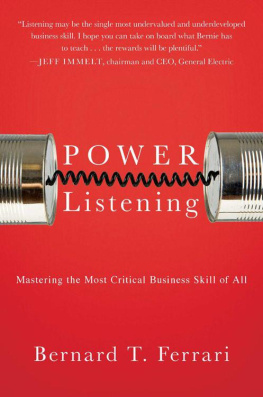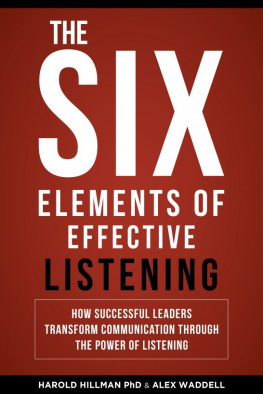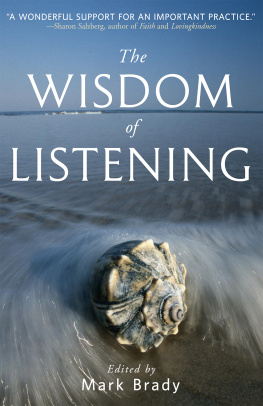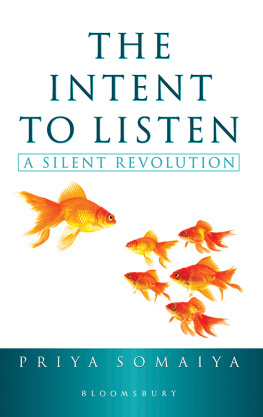POWER
Listening

POWER
Listening
 Mastering the Most Critical
Mastering the Most Critical 
Business Skill of All
B e r n a r d T. F e r r a r i
P O R T F O L I O / P E N G U I N
PORTFOLIO / PENGUIN
Published by the Penguin Group
Penguin Group (USA) Inc., 375 Hudson Street,
New York, New York 10014, U.S.A.
Penguin Group (Canada), 90 Eglinton Avenue East, Suite 700, Toronto, Ontario,
Canada M4P 2Y3 (a division of Pearson Penguin Canada Inc.)
Penguin Books Ltd, 80 Strand, London WC2R 0RL, England
Penguin Ireland, 25 St. Stephens Green, Dublin 2, Ireland
(a division of Penguin Books Ltd)
Penguin Books Australia Ltd, 250 Camberwell Road, Camberwell, Victoria 3124,
Australia (a division of Pearson Australia Group Pty Ltd)
Penguin Books India Pvt Ltd, 11 Community Centre, Panchsheel Park,
New Delhi 110 017, India
Penguin Group (NZ), 67 Apollo Drive, Rosedale, Auckland 0632,
New Zealand (a division of Pearson New Zealand Ltd)
Penguin Books (South Africa) (Pty) Ltd, 24 Sturdee Avenue,
Rosebank, Johannesburg 2196, South Africa
Penguin Books Ltd, Registered Offices:
80 Strand, London WC2R 0RL, England
First published in 2012 by Portfolio / Penguin,
a member of Penguin Group (USA) Inc.
1 3 5 7 9 10 8 6 4 2
Copyright Bernard T. Ferrari, 2012
All rights reserved
LIBRARY OF CONGRESS CATALOGING IN PUBLICATION DATA
Ferrari, Bernard T.
Power listening : mastering the most critical business skill of all / Bernard T. Ferrari.
p. cm.
Includes index.
ISBN 978-1-101-56054-9
1. Business communication. 2. Listening. I. Title.
HF5718.F48 2012
658.45dc23
2011037614
Set in Baskerville
Designed by Jaime Putorti
Without limiting the rights under copyright reserved above, no part of this publication may be reproduced, stored in or introduced into a retrieval system, or transmitted, in any form or by any means (electronic, mechanical, photocopying, recording or otherwise), without the prior written permission of both the copyright owner and the above publisher of this book.
The scanning, uploading, and distribution of this book via the Internet or via any other means without the permission of the publisher is illegal and punishable by law. Please purchase only authorized electronic editions and do not participate in or encourage electronic piracy of copyrightable materials. Your support of the authors rights is appreciated.
Dedicated to the first listeners
in my life, my parents.
AUTHORS NOTE AND
ACKNOWLEDGMENTS
When I first contemplated this book, I asked myself if anyone would really be interested in reading about listening for the purpose of arriving at a better business decision. My question stemmed from a comment made to me years ago by an executive, who said, No one in business listens! They dont see any need to. The longer I thought about that comment the more misguided this attitude seemed to be, and the more convinced I became that I should tackle the subject. For starters, I realized that the greatest business managers Ive encountered show an uncanny ability to listen. Further, I couldnt deny the fact that I had derived my own way of listening by observing the many talented executives whom I had the privilege to advise, as well as those McKinsey & Company colleagues who demonstrated their own great listening skills over the twenty years I was part of the Firm. Fortified by the conviction that good listening figures centrally in business performance, and that my goal was to pass on a collected set of lessons, I began to write.
Still, something was missing. I grew concerned that perhaps the executives who constituted my research sample group were tainted by some selection bias. They were all my clients, after all. So in hopes of sidestepping that particular trap, I asked many of McKinseys current partners to nominate the best business listeners they had encountered, for additional interview subjects. To my relief and my delight, virtually everything I heard in this new round of interviews confirmed and reinforced what I had learned from my clients.
I had two considerations in writing this book, beyond the subject itself. The first was to make the book as applicable to the beginning manager or business decision maker as to the more seasoned executive. The second was to be respectful of the readers time. I have been as economical in my prose as my ability allows, while still getting across everything I believe to be relevant.
I also want to make the important point that gender offers no advantage or disadvantage to listening in the workplace. I ask you to bear this in mind whenever you come across the use of the masculine pronoun in this book, when a construction like he or she or him or her might feel more correct. I have used the masculine pronoun only to simplify the style and presentation of the book.
In my service to my clients, I always considered myself a guest in their companies, and always had a professional and legal obligation to keep their confidences. When they gave me permission to tell their stories, I have used their names. When they were shy about doing so or when I used individuals stories as examples of what not to do, I changed the situations and the industries in question so they would be unidentifiable, perhaps even to the subjects themselves.
I have been fortunate to have a great deal of support in writing this book. I must acknowledge Jeffrey Immelt, who encouraged me and graciously wrote the foreword. My friends and colleagues at McKinsey & Company, who identified the great listeners and taught me much of what I share with you, are too numerous to thank individually. They know who they are, and I thank each of them for their generosity and partnership. A few played a special role, including Dominic Barton, Michael Patsalos-Fox, Ted Hall, the late Roger Kline, Larry Kanarek, Vik Malhotra, and Pete Walker.
I had the good fortune to observe a number of great listeners during one of my earlier lives, in medicine. The late Dr. George Engel, as a professor of psychiatry at the University of Rochester, provided me and my fellow medical students our first lessons in listening. He once told me that I had a lot of work to do to be a perceptive physician, but added that he had faith in me. He was right about the work to be done, and I very much hope that he would approve of this effort. Another mentor was the late Dr. William Longmire, a professor and the chairman of surgery at UCLA. He was one of those rare individuals who, after a brief conversation in which he would ask a few key questions, would appear to know your mind. And I want to send my apologies to Dr. Frank Riddick, who gave me my first managerial job at the Ochsner Clinic in New Orleans, Louisiana, and who knew better than anyone how bad a listener I was. Thank you, Frank, for never giving up on me.
I warmly thank Killian Clarke, my trusted and valuable research assistant, for his work on this project. Without Killian there would be no book. Jessica Goethals ensured that we got our medieval and Renaissance facts right. Others at Ferrari Consultancy who provided support were Todd Johnson, Patrick Sullivan, and Sherry Babb. David Sobel was a great help, providing valuable editorial support. Many times, when I found myself tongue-tied, David was able to loosen the knots. Jim Levine, my literary agent, and William Hart, my attorney, provided great guidance and encouragement. The professionals at Portfolio, including my talented editor, Jillian Gray; one of the wise men of publishing, Adrian Zackheim; and the great marketing and publicity team, Will Weisser, Allison McLean, and Tiffany Liao, got this work over the finish line with minimal pain to the author.
Next page








 Mastering the Most Critical
Mastering the Most Critical 